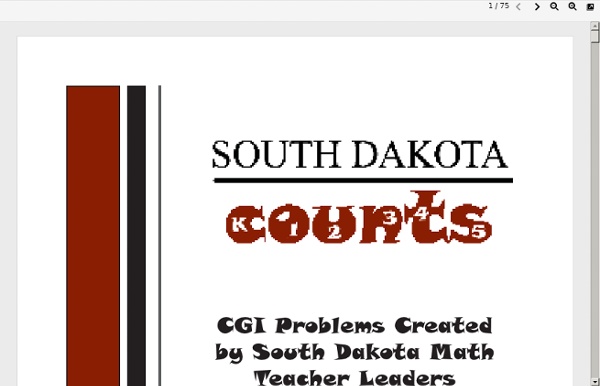



The University of Arizona - Institute for Mathematics & Education The Common Core State Standards in mathematics were built on progressions: narrative documents describing the progression of a topic across a number of grade levels, informed both by research on children's cognitive development and by the logical structure of mathematics. These documents were spliced together and then sliced into grade level standards. From that point on the work focused on refining and revising the grade level standards. The early drafts of the progressions documents no longer correspond to the current state of the standards. It is important to produce up-to-date versions of the progressions documents. They can explain why standards are sequenced the way they are, point out cognitive difficulties and pedagogical solutions, and give more detail on particularly knotty areas of the mathematics. This project is organizing the writing of final versions of the progressions documents for the K–12 Common Core State Standards.
illustrativemathematics Illustrated Standards Count to 100 by ones and by tens. (see illustrations) Count forward beginning from a given number within the known sequence (instead of having to begin at 1). Write numbers from 0 to 20. Understand the relationship between numbers and quantities; connect counting to cardinality. When counting objects, say the number names in the standard order, pairing each object with one and only one number name and each number name with one and only one object. Understand that the last number name said tells the number of objects counted. Understand that each successive number name refers to a quantity that is one larger. Count to answer “how many?” Identify whether the number of objects in one group is greater than, less than, or equal to the number of objects in another group, e.g., by using matching and counting strategies. Compare two numbers between 1 and 10 presented as written numerals. Fluently add and subtract within 5. Compose simple shapes to form larger shapes.
Webcast - Beyond Slices of Pizza: Teaching Fractions Effectively This webcast, Beyond Slices of Pizza: Teaching Fractions Effectively, was coordinated by The Center on September 23, 2008. Video from the webcast Complete video from the webcast. (no longer available)Additional video interview with Denise Mewborn: Fractions are everywhere in the real world (no longer available) This webcast video was hosted by New Media, but the video is no longer available, because their video hosting contract has ended. Additional Resources About the Webcast The National Mathematics Advisory Panel, convened in 2006 by President George W. Its final report, released this spring, paid close attention to several areas of mathematics, particularly "proficiency with fractions...for such proficiency is foundational for algebra and, at the present time, seems to be severely underdeveloped." The webcast features videotaped segments from Dr. Featured Speakers Dr.
Mathematics K-5 · CCGPS Mathematics Grades K-5 · CCGPS Mathematics Glossary Third grade teachers working on unit revisions at GaDOE (June 2013) 2013-2014 CCGPS Mathematics Unit Frameworks Teacher and Student Editions of the 2013-2014 CCGPS Mathematics Unit Frameworks were posted on July 1, 2013, to GeorgiaStandards.Org and Learning Village. K-5 CCGPS Mathematics Overview The K-5 standards are organized using domains, overarching ideas that connect topics across the grades, clusters that illustrate progression of increasing complexity from grade to grade and standards which define what students should know and be able to do at each grade level. The K-5 standards are organized in the following domains: counting and cardinality; operations and algebraic thinking; number and operations in base ten; number and operations – fractions; measurement and data; and geometry. The focus in the K-5 standards is comparable to that seen in high-performing countries.
Math Play - Free Online Math Games